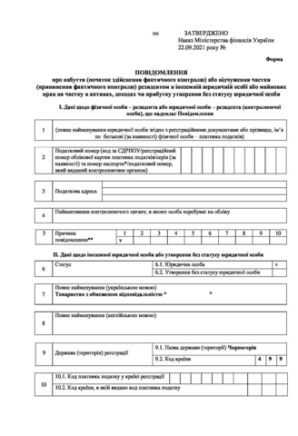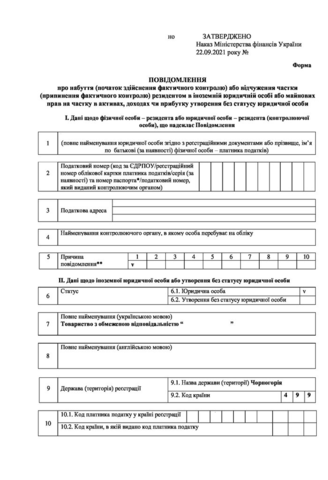Registering a Foreign Company under a Trusted Person: Protection from Filing a CFC Report in Ukraine
Cost of services:
Reviews of our Clients
... our work on joint projects assured us of your high level of professionalism
In recent years, Ukrainian laws have required citizens controlling foreign companies to submit reports on controlled foreign companies (CFCs). This has led to an increased interest in various schemes designed to minimize the risk of falling under tax control.
Recently, a client approached us with an inquiry about registering a foreign company under a trusted person. The essence of the offer was to register the business under a third party (nominal owner) to avoid the obligation to submit a report on the controlled foreign company (CFC) under Ukrainian law.
The client sought our legal advice regarding the legality of this arrangement and the potential risks associated with such a scheme. Specifically, they were concerned about whether this approach could effectively reduce the tax burden while retaining control over the assets. In this article, we will explore the mechanisms used to implement such schemes, their advantages and disadvantages, as well as the potential legal consequences for the beneficiary.
You might also like: Tax Residency of Ukraine and CFC: Tax Optimization for International Business
Registering under a Nominee: The Mechanism and Basic Advantages
Registering a company under a nominee owner means that a third party (either an individual or a legal entity), who is not directly connected to the actual beneficiary, formally becomes the owner of the business. This approach allows the real owner to legally distance themselves from the company and avoid the requirement to submit a CFC (Controlled Foreign Company) report, as the Ukrainian citizen is not officially the owner of the assets.
Below are the pros and cons of registering a company under a nominee:
Pros:- No obligation to submit CFC reports, since the Ukrainian citizen is not formally the controlling party, there is no need to file reports on controlled foreign companies.
- Protection of the actual beneficiary’s information, if the company's registration details do not require disclosure of the nominee owner, it helps protect the real beneficiary's identity.
- Potential risks of losing control over the asset, especially if the nominee owner refuses to fulfill their obligations or becomes involved in a conflict.
- High cost of reliable nominee services, especially when reputable and verified agencies are involved.
- In some countries, additional documents or registration in the beneficial ownership registry may be required. This can partially disclose information about the actual owner.
To minimize these risks, various additional contractual mechanisms are used, which we will discuss further.
You might also like: How to Submit a Notification of a Controlled Foreign Company in Ukraine?
Option Agreement: Mechanism and Features of Application
An option agreement gives the real owner of a company the ability to "buy back" shares or stakes from the nominee owner at a pre-agreed price at any time. This approach allows the actual owner to maintain control over the asset without the need for formal ownership.
In legal terms, an option agreement is a contract under which the possibility of one-sided purchase or sale of the subject of the agreement (usually shares or stakes in companies) arises within or after a specified period at a previously determined price.
The subject of an option agreement regarding a stake in the authorized capital is the corresponding share in a limited liability company. Depending on the type of option, the following legal constructs are distinguished:
- Put Option (to sell a stake).
- Call Option (to buy a stake).
- Buy-Sell Option is a combination of the two aforementioned constructs, guaranteeing the buyer the opportunity to purchase a certain number of shares from the seller in the future, while simultaneously guaranteeing the seller the obligation to sell the specified number of shares to the buyer in the future.
The put option allows one party (the option holder) to require the other party (the option seller) to buy the stake from them on a specified date and at an agreed price. Additional conditions may be set under which the option holder has the right to sell, such as meeting certain financial targets or changes in the company's management structure.
The price can be fixed, tied to market value, or determined in other ways (for example, based on the company’s performance indicators).
Advantages for the option holder (seller) of a put option:
- The ability to lock in a minimum sale price, thus reducing the risk of fluctuations in share value.
- A guarantee of a possible exit from the business under predefined conditions.
Advantages for a put option buyer:
- The ability to purchase company shares within a set timeframe and at a fixed price.
- Flexibility in capital structure and control over the conditions for buying back the shares.
The call option is the opposite of the put option. In this arrangement, the option holder (buyer) has the right to require the option seller to buy the stake from them according to the terms of the option agreement.
Advantages for the holder of a call option (buyer):
- The ability to lock in a purchase price for shares can be advantageous if the company’s value increases.
- Gaining control over shares or stakes in the company if other terms of the agreement are met.
Advantages for the seller of a call option:
- Additional income from the premium charged when the agreement is concluded.
- The possibility of attracting an additional investor and structuring a gradual exit from the company.
Considering the above, it can be concluded that option contracts are used more as a financial investment tool with the possibility of acquiring shares after a certain period by an economic entity that is not the actual owner of the shares, rather than as a tool designed for controlling the company’s assets and decisions related to the management of the company’s current activities. Given that the option does not provide ownership rights until it is exercised, the option does not grant management rights in the company. Consequently, the option does not give the beneficiary control over management actions until it is exercised.
Additionally, considering that in many countries the option contract is still not regulated at the legislative level (e.g., Poland, Italy, Czech Republic, Mexico) and falls under the norms of civil law, being treated as part of contractual relations governed by the Civil Code, such contracts may require special attention to the terms to ensure their legal force and protection of the parties' rights.
You might also like: Tax Residency in Ukraine: How to Determine Tax Status and Avoid Double Taxation
Share Pledge Agreement: Guarantee of Ownership Return
A share pledge agreement involves transferring the shares of a company, registered in the name of a nominee, as collateral to the actual beneficiary. In the event of a conflict or failure to fulfill obligations by the trustee, the actual beneficiary may exercise the right of pledge to regain control. For example, in Poland, a share pledge agreement (or for interests) is used as a means of securing obligations and controlling the asset until the final transfer of ownership rights.
In Poland, a share pledge does not require mandatory notarization for legal validity. However, if the pledge concerns shares in a private company (such as a sp. z o.o., which is similar to an LLC), notarization of the signatures of the parties may be required to ensure the legal force of the agreement. This is done to provide additional protection for the beneficiary's interests and create clear evidence of the transaction.
For companies like sp. z o.o. and S.A. (the equivalent of a joint-stock company), the share pledge agreement must be recorded in the company's share register. This means that the company's corporate documents must be updated to reflect the pledge, and the shareholder register must include a note indicating that the shares are pledged.
In Poland, the Central Register of Beneficial Owners is in place, and companies must disclose information about their ultimate beneficial owners. However, a share pledge agreement does not necessitate the disclosure of the pledge beneficiary's information in this register, as the pledge itself does not involve the transfer of ownership rights. The beneficiary, as the pledgeholder, does not become the owner of the shares and therefore is not required to be registered as the beneficial owner of the company.
The company's corporate documents and share register will note the pledge. This restricts the rights of the nominal owner to dispose of the shares without notifying or obtaining the consent of the beneficiary. However, such information is generally not available to third parties outside of the company and is intended for internal record-keeping.
If the nominal owner breaches their obligations (e.g., refusing to transfer the shares when the conditions are met), the pledgeholder has the right to seize the pledged asset, i.e., take ownership of the shares. To facilitate this, the agreement may include provisions that allow for the direct seizure of shares in the event of a failure to fulfill obligations.
A pledge agreement may include provisions that prohibit the nominal owner from transferring the shares without the consent of the pledgeholder.
If the contract includes the appropriate conditions, the parties can register the pledge in the National Pledge Register (Krajowy Rejestr Zastawów). A registered pledge grants the pledgeholder additional rights, such as the right to satisfy claims from the shares in case the pledged obligation is fulfilled.
As we can see, a share pledge agreement can be an excellent option for securing control over a company's assets.
Preliminary Sale and Purchase Agreement: The Basis for Changing Control
A preliminary sale and purchase agreement implies that the actual beneficiary and the nominal owner agree on the possibility of selling shares or stakes in the future. This approach helps legally establish the beneficiary's interest in the asset, retaining their right to make a future purchase.
Unlike an option, which only provides a right and not an obligation for its holder, a preliminary agreement obligates both parties to conclude the main transaction. This means that:
- The seller is legally bound to complete the transaction within the agreed timeframe.
- The buyer can demand judicial enforcement of the terms of the agreement if the seller refuses or attempts to avoid fulfilling their obligations.
If the seller, such as a nominal owner, attempts to breach the contract and fails to transfer the shares, the preliminary agreement allows the buyer (the beneficiary) to demand forced performance of the obligations. In Poland, for example, such agreements may include provisions for enforcement measures, significantly reducing the risk of non-performance by the seller.
A preliminary agreement usually includes clear and comprehensive terms of the transaction, such as:
- Exact deadlines for fulfilling obligations.
- The price of the shares and the formula for its calculation, protecting the buyer from changes in value.
- All essential terms and mechanisms for protecting the parties, including penalties that may be provided in case of breaches.
This minimizes the possibility of misunderstandings or disputes in the future. Unlike an option, which is of a potential nature (a right but not an obligation), a preliminary contract provides fixed terms and specific deadlines.
A preliminary sale and purchase agreement can include protective measures for the buyer, such as:
- Penalties for non-performance of obligations.
- Compensation for losses and lost profits.
- The right to pursue legal action for reimbursement if the seller breaches the contract.
These elements provide additional guarantees for the buyer, which are typically absent in standard option contracts.
A preliminary agreement establishes mandatory deadlines for performance, which simplifies planning and provides certainty for the buyer. This is particularly important in situations where strict adherence to a schedule is required, such as protecting against changes in the market value of shares. In an option agreement, such deadlines are usually flexible and depend on the buyer's discretion, making it less predictable.
The preliminary agreement may include conditions that limit the actions of the nominal owner until the deal is completed. For example:
- The nominal owner may be prohibited from transferring the shares or encumbering them with third parties without the consent of the beneficiary.
- The contract may impose obligations on the nominal owner to perform all actions necessary for the transfer of the shares, restricting their independent control over the asset.
An option typically does not provide such control, as the nominal holder owns the shares until the option is exercised.
Trust Structures: Preserving Complete Privacy and Confidentiality
A trust is a legal structure in which one person (the settlor) transfers assets to be managed by another person (the trustee), who manages these assets for the benefit of third parties (the beneficiaries). Trust structures are widely used for asset protection, estate planning, tax minimization, and maintaining confidentiality.
An important feature of a trust structure is that once the settlor transfers the assets into the trust, they lose formal control over them. The trustee becomes the legal owner of the assets, although they are obligated to manage them solely in the interests of the beneficiaries. The settlor cannot interfere with the management of the trust unless specifically allowed in the trust agreement. This means:
- The settlor loses the right to dispose of or make decisions regarding the assets.
- Formally, the assets no longer belong to the settlor, reducing the risks associated with creditor claims or tax liabilities.
Trust structures provide a high level of confidentiality and asset protection:
- Formally, the assets are owned by the trustee, not the settlor, which protects them from creditor claims or property disputes aimed at the settlor.
- In some jurisdictions, trusts do not require public disclosure of information, safeguarding beneficiaries from having their details disclosed in public registers.
If the trust is properly structured, the settlor truly "steps away" from the assets and will be considered a controller under the Controlled Foreign Company (CFC) legislation. Moreover, if an irrevocable discretionary trust is set up, it can ensure that neither the settlor nor the beneficiaries need to disclose their identities under CFC laws.
You might also like: How to Exit from Ukrainian Tax Residency?
The Role of Legal Consultation in Protecting Assets and Business Interests
The analysis conducted suggests that registering an offshore company with a trustee is an effective method to protect against the reporting requirements of the CFC regulations in Ukraine. However, it's essential to remember that the choice of mechanism depends on the jurisdiction and requires a comprehensive approach, including consultations with lawyers. The decision between an option agreement, pledge agreement, preliminary agreement, or trust depends on the beneficiary’s objectives and their willingness to incur costs and navigate legal complexities.
Our team assisted the client in assessing the legality and risks of the proposed scheme, as well as in developing an optimal strategy for protecting their assets in accordance with Ukrainian and international law. Thanks to our professional approach, we provided the client with confidence in the safety of their business and legal security.
If you find yourself in a similar situation and wish to protect your assets while avoiding tax and legal risks, feel free to contact us. We are ready to offer tailored solutions to help you achieve your goals without violating the law.
Contact our experts for professional consultation and to choose the best solution for your needs!
Our clients








